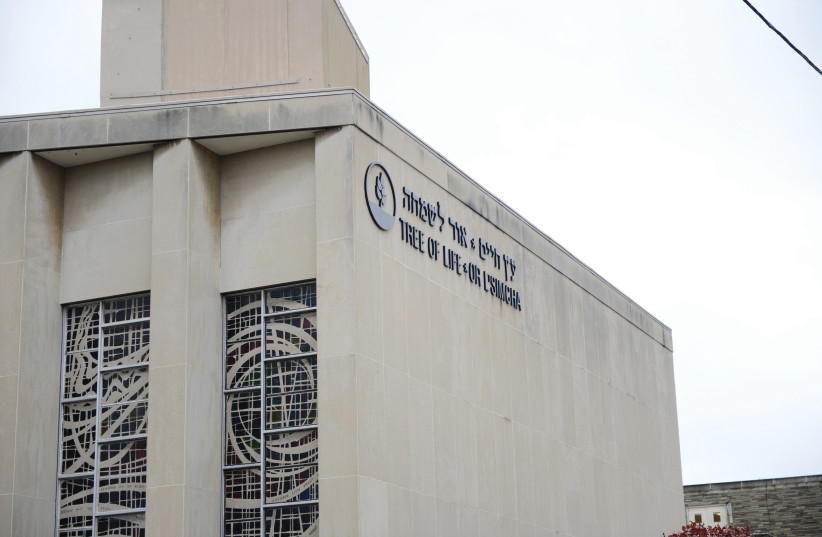It’s very difficult to watch A Tree of Life: The Pittsburgh Synagogue Shooting, an HBO documentary released this week to mark the fourth anniversary of the tragic attack that took the lives of 11 Jews, but it is worthwhile.
This graceful, moving film by Trish Adlesic was executive produced by Michael Keaton, Mark Cuban and Billy Porter and puts the victims and survivors of the killings that took place at the Tree of Life Synagogue in Pittsburgh front and center. What you will remember most from the film is the dignity of the survivors and victims’ families in the face of heartbreaking loss.
It shows only a brief news clip of the shooter and delves into the charged political climate of the time. This massacre took place a little over a year after the Unite the Rally in Charlottesville, Virginia, where white supremacists marched and chanted, “Jews will not replace us”. Fewer than three years before, a mob – many wearing shirts with antisemitic messages – stormed the Capitol to try to overturn the outcome of the 2020 presidential elections.
At one point, the documentary features commentators who speak about failed gun control measures, including an FBI agent who spends time addressing the public at synagogues to teach how to respond to an active shooter situation. The movie also briefly traces the history of antisemitism in the US and we can all understand, as one of the interviewees says, that the era when US synagogues could leave their doors open and operate without armed guards is over.
The political context and historical background are necessary to tell this story, but the focus is squarely on the people who were part of the three congregations that worshiped in the Tree of Life synagogue. Each survivor tells of the events of that day from his or her own perspective and it paints a vivid picture of the chaos and terror of the events of that Saturday morning.

As difficult as it is for the victims to speak, you sense that they need to tell their stories. The more you see of those who survived and learn about those who were lost, the more incomprehensible and horrific the attack becomes. Who would anyone want to kill these people – why would anyone want to harm strangers who happen to be at religious services? The very nature of antisemitism is thrown into sharp focus.
EACH STORY is compelling separately and heard together they make a multilayered portrait. The interviews are interspersed with footage of a performance by the Philadelphia Orchestra of Hannibal Lokumbe’s “Healing Tones,” at a concert to honor the memory of the victims, where Audrey Glickman, one of the survivors of the shooting, played the shofar.
There are moments of grace following the tragedy. Wasi Mohamed, the former executive director of the Islamic Center of Pittsburgh, organized a crowd-funding campaign to pay for all the victims’ funerals. Others started projects to encourage people to perform mitzvot (good deeds) in memory of the victims.
Gradually, a picture emerges of the Squirrel Hill Jewish community. One of the victims, Rose Mallinger, was 97 and had been attending her congregation for 60 years. Her daughter, Andrea Wedner, was shot alongside her mother but managed to survive, and she remembers her mother as someone whose life was filled with love. “If love alone could have spared her, she would have lived forever,” Wedner says.
This could also be said of the two brothers, Cecil Rosenthal and David Rosenthal, who were killed. Both of them had fragile X syndrome, a complex genetic disorder that in their cases caused mild mental retardation. They loved coming to the synagogue and took pride in being given roles to perform there, such as carrying the Torah.
I couldn’t watch the section of the film about them without thinking of my own son, a young adult with autism, who looks forward all week to going to synagogue on Saturday morning, where he is received with love by the entire congregation. It’s heartbreaking to see the Rosenthal brothers’ family reminiscing about Cecil and David, who were murdered in what their parents likely thought was the safest place they could be.
If there can be any consolation in this story, it can be read in the faces of his family, as they listen to community members who remember the brothers with great affection. Even the florists whose shops they used to drop into on a daily basis cry as they speak about missing them. One of the florists mentions the saying, “May his memory be a blessing,” and adds, “That’s what it is.” That sentiment can likely be shared by everyone who sees this documentary as well.
